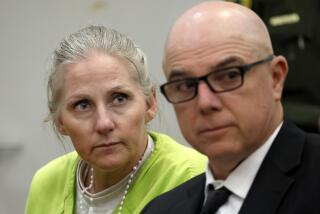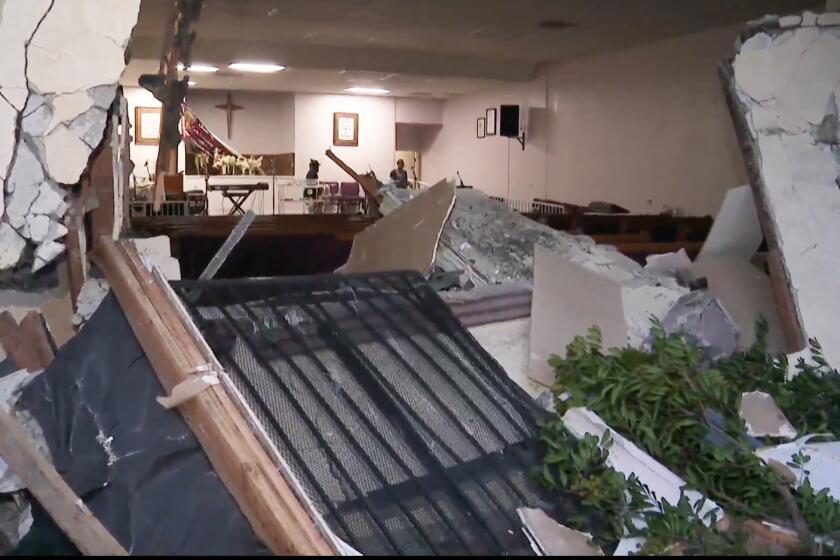Doctor Says He Was ‘Upset’ Before Fatal Crash : Accident: Physician who is jailed on manslaughter charges after couple are killed and child is injured in collision blames crash on his father’s death hours before.
As Dr. Ronald Joseph Allen was led to jail on manslaughter charges Wednesday, he offered a muffled, halting explanation about the Sunday accident in which he is accused of killing two people while driving under the influence of drugs.
“My father died,” the young internist said, hiding his face from television cameras. “I was upset and my father died.”
The Laguna Beach physician with a history of drug-related arrests said nothing further after referring to his father’s death in Chicago just hours before the head-on collision that killed Mark and Noreen Minzey of Mission Viejo and injured their 11-year-old daughter, Karie, who remained hospitalized in extremely critical condition Wednesday.
Released from the hospital with minor injuries, Allen, 31, his blond hair disheveled, was escorted in a Sheriff’s Department van to the Orange County Jail in mid-afternoon. Allen is being held at the jail on $250,000 bail.
Police allege that Allen, who moved to Orange County last year after completing his residency at Northwestern University in Chicago, was under the influence of drugs and perhaps alcohol when he swerved into the opposing lane and hit the Minzeys’ Dodge Aries sedan outside Orange.
He will likely be arraigned today on charges of gross vehicular manslaughter while intoxicated. California Highway Patrol officers are asking prosecutors to file murder charges against the doctor, but Deputy Dist. Atty. Robert Molko said Wednesday that no decision had been made on that issue.
Authorities also alleged Wednesday that Allen had an open bottle of wine in his car at the time of the fatal collision, and he may face an additional criminal charge as a result.
Last year, Allen began treating AIDS and HIV-infected patients at South Coast Medical Center in Laguna Beach--many of them lower-income. He graduated from Rush Medical College, a small alternative school in Chicago, completing his residency at nearby Northwestern University. Supervisors there praised his medical and personal skills Wednesday.
“He was a fine resident at Northwestern,” said Dr. John Phair, who was the attending physician when Allen took a course in infectious diseases. “There was no indication that he in any way had any problem that would relate to this (arrest).”
But Allen had his medical privileges cut off at the South Coast Medical Center in June after he was charged with drunk driving, hit-and-run and resisting arrest after a three-car accident.
After the crash, according to police reports, Allen resisted officers and said “he wanted to die, that he wanted a gun so he could shoot himself. Allen said that we did not understand, that his wife had just died.” Allen is unmarried.
He now finds himself at the center of a debate over whether the law enforcement and state medical communities ignored red flags in allowing Allen to stay on the road even after he had been arrested twice for drunk driving and had his medical privileges suspended.
Laguna Beach Police Chief Neil J. Purcell said Wednesday that he understood from one of his watch commanders that Allen had been stopped for an unspecified traffic violation on Saturday--a day before the fatal accident--but that Highway Patrol officers had failed to arrest him on an outstanding warrant stemming from a drunk-driving charge.
But Purcell said he could not provide any other details on the incident, and CHP supervisors and officials in Orange and San Diego counties said Wednesday that they could find no record of the alleged stop after daylong searches.
The California Medical Board has acknowledged that a report on Allen’s suspension from the medical center sat in a clerk’s office for a month rather than sparking an investigation into the physician’s behavior.
Even before his last accident in June, Allen faced a $7,500 arrest warrant for allegedly failing to appear in court to answer an earlier charge of drunk driving. That charge stemmed from an April 3, 1992, accident in which authorities say Allen rear-ended a car on Crown Valley Parkway in Laguna Niguel.
Allen told police he had had two beers at a local restaurant and took prescription drugs that day. “I haven’t eaten all day,” Allen told the deputies. “That’s why I seem more intoxicated than I am.”
Laguna Beach police failed to arrest Allen on the warrant at the time of his June accident because Purcell said the county’s computerized warrant system was down and officers were unable to check. “When the system is down, there’s no getting into it,” Purcell said.
The chief also expressed doubt that arresting Allen on the 1992 warrant would have “made a big difference in this case.”
“We have a lot of people out walking, working, driving, doing whatever, that have warrants on them,” Purcell said. “It just is not unusual to have people with us in this society with these types of warrants out.”
Purcell said someone with an outstanding warrant may go undiscovered for a year, unless they turn themselves in or are stopped by a law enforcement officer who runs a warrant check. And even if an officer learns about an outstanding warrant, Purcell said, the detainee may avoid arrest because of overcrowding at Orange County Jail or police staffing shortages.
But Assemblyman Gil Ferguson (R-Newport Beach), who had an aide call the Laguna Beach police Wednesday to find out about the Allen case, said he was “discouraged and disgusted by the failure of law enforcement officials to avert the tragedy.”
“One of the things I’ve learned since being in government that I never wanted to know as a citizen is just how slipshod the entire criminal justice system is,” Ferguson said. “People believe what they see on TV about checking on fingerprints and everything, and nothing could be farther from the truth in actuality.”
One answer, Ferguson said, could come through offering peace officers financial bonuses for serving arrest warrants and allowing them to perform the task in off-duty hours. “They’d have the decks cleared (of outstanding warrants) in two weeks,” he said.
More to Read
Start your day right
Sign up for Essential California for news, features and recommendations from the L.A. Times and beyond in your inbox six days a week.
You may occasionally receive promotional content from the Los Angeles Times.






